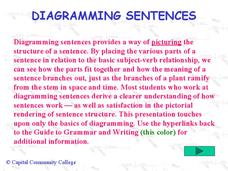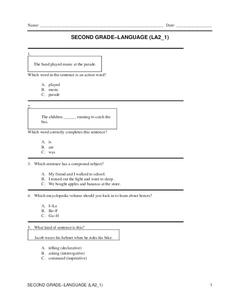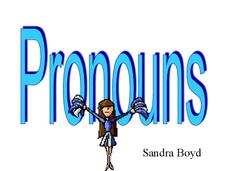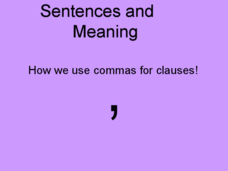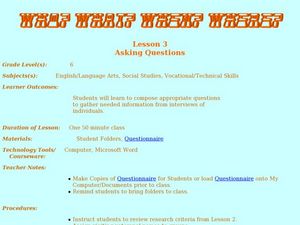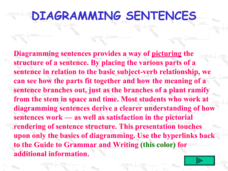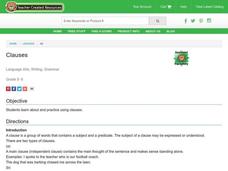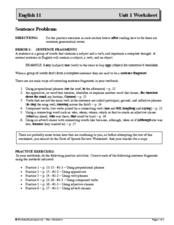Curated OER
Diagramming sentences
In an orderly fashion, go through diagramming sentences with your class. Beginning with a simple sentence and the placement of subject and verb, subsequent slides slowly add on more branches and lines with explanations of sentence types...
Curated OER
The Fanboys
Students explore coordinating conjunctions in order to explore how to properly use them in compound sentences. The differences in structure between simple and compound sentences are analyzed.
Curated OER
Second Grade Language
In this language arts worksheet, 2nd graders complete fill in the blank and multiple choice activities about subjects, pronouns, dictionary work, and more. Students complete 25 questions.
Curated OER
Pronouns
Subject, object personal. Possessive, reflexive, indefinite. Everything you want to know about pronouns and their antecedents is contained in a colorful 32-slide presentation.
Curated OER
Varying Sentence Structure
Show your writers how to use simple, compound, and complex sentences to add variety to writing. In addition, examples show how to employ semicolons and coordinating conjunctions to combine sentences. Colorful illustrations and graphics...
Curated OER
Changing Verb Voice (Active/Passive) Practice
In this active voice and passive voice practice worksheet, learners read an informative lesson. Students then respond to 5 questions that require them to identify the voice the sentences are written in and rewrite them in the opposite...
Curated OER
Topic: English - 'Making Connections' - Coordinating Conjunctions
In this sentence writing worksheet, students learn about using conjunctions in sentences. They then use what they learned to answer the 6 questions on the worksheet. The answers are on the last page.
Curated OER
Sentence Construction: What is a Sentence?
What must a sentence contain in order to be complete? What different types of sentences exist? Look at declarative, interrogative, and exclamatory sentences with this 17-slide presentation. Several example sentences are shown, and the...
Curated OER
If I Could Have Lived in Another Time or Culture
Third graders develop multi-paragraph compositions. They include an introduction, first and second level support, and a conclusion. They use a variety of sentence structures (e.g., simple, compound/complex) and sentence types (i.e.,...
Curated OER
Conquering the Comma
Thoroughly review where to put commas: after an introductory clause, before a coordinating conjunction, around nonessential phrases, etc. Furthermore, avoid comma splices by adding a conjunction or semicolon or by starting a new sentence...
BW Walch
Daily Warm-Ups: Grammar and Usage
If grammar practice is anywhere in your curriculum, you must check out an extensive collection of warm-up activities for language arts! Each page focuses on a different concept, from parts of speech to verbals, and provides review...
Curated OER
Understanding Predicates
Learners identify predicates in a sentence. In this grammar lesson, students highlight the subject and predicate in various sentences. Learners examine the various types of predicates and practice identifying them in a sentence. This...
Curated OER
Pronoun Case Worksheet 2
In this grammar activity, students read and underline the subjects in fifteen sentences. Students write their answers on the lines provided.
Curated OER
Writing with Style: Six Traits of Good Writers
Fourth graders listen as the teacher reads a picture book that emphasized word choice. They discuss words and how word choice impacts a piece of writing. Students view various passages on the overhead, and highlight adjectives and verbs...
Curated OER
How we use Commas for Clauses!
Commas can be tricky to use and can also greatly affect sentence meanings. Use this wonderful PowerPoint to remind your class when it is appropriate to use a comma. The last slide includes sentence samples for practice.
Curated OER
Who? What? When? Where? Asking Questions
Sixth graders interview Veterans or role play to answer who, what, where, when questions. In this Veteran's Day questioning activity, 6th graders learn about the events in the military service of veterans. Students may simulate...
Curriculum Corner
“I Can” Common Core! 3rd Grade Language
Support third graders with developing their language skills using this Common Core checklist. With each standard written as an I can statement, children are given clear learning goals to work toward throughout the year.
Shmoop
ELA.CCSS.ELA-Literacy.L.9-10.1
If you're completely lost on what grammar you should cover for Common Core skill L.9-10.1, look here! You will find some ideas and examples on what to include, making sure your learners can master the skill. The multiple choice quiz is...
Tech Coach Corner
Diagramming Sentences
Show this presentation to demonstrate how to diagram sentences. Meant for more advanced grammarians who know the difference between indirect and direct objects, this PowerPoint adds on new elements to each slide. The graphics and sound...
Curated OER
Paul Revere's Ride
Third graders read and discuss the selection "Paul Revere's Ride" (included with the lesson). Students imagine they live in one of the villages that Paul Revere stopped. They are awakened by his knock on the door. Students write an essay...
Curated OER
Clauses
Students understand that there are different types of clauses and define the differences. In this clauses instructional activity, students complete activities to practice works with different types of clauses.
Curated OER
Sentence Problems
Writing is tough to perfect. Help your class improve their writing skills by studying different sentence problems. This reference guide covers sentence fragments, run-ons, and misplaced modifiers, but that's just to start! There's a...
Curated OER
Independent and Dependent Clauses
Have learners identify the main clause, subordinate clause, and relative clause within a sentence. One page of definitions and examples accompanies a page of exercises for scholars to practice finding the various clauses.
Curated OER
Not So Personal Pronouns
There are six types of pronouns to explore! Put on your thinking hat and read about each type: demonstrative, indefinite, intensive, interrogative, and reflexive. This worksheet comes with two pages of explanations and examples, and it...
